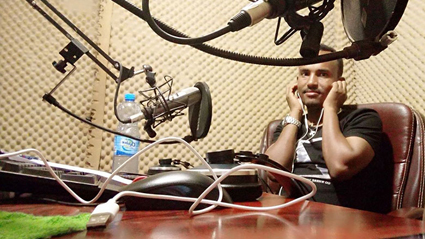Annual Update 2021 VNG International

Radio shows promote accountable service delivery.
Photo credit: World Bank (2021)
‘Now, thanks to SA, there’s improved medicine availability at the pharmacy and it has reduced the time we spend in search of drugs.’
Ms. Alemtsehay Demissie,
women’s representative on her local accountability committee in Arsi Negele, Oromiya region.
‘The long-term impact of the COVID pandemic requires redoubling efforts and innovations to ensure that the availability and use of services translate into economic and human development outcomes. This calls for better promoting equity and social inclusion while bolstering state capacity and accountability.’
Mr. Ousmane Dione,
Country Director for the World Bank
for Ethiopia.
‘Over the years ESAP has developed a strong position of trust with both civil society and the government in Ethiopia.’
Mr. Paul Hamilton,
Team Leader ESAP VNG International.
Involving Citizens in Decision Making by strengthening democratic local government
Featured Project
Ethiopia, Social Accountability Programme (ESAP)
Since 2006, the Ethiopia Social Accountability Programme (ESAP) has used social accountability (SA) processes to help citizens address local problems in basic services, such as health, education and water, with government and service providers to find a solution to improve their quality of life. In partnership with civil society organisations across the country, the programme aims to increase the level of trust between citizens, service providers and the government. ESAP is financed by the World Bank and a Multi-Donor Trust Fund with contributions from Austria, the European Commission, Ireland, Sweden and the United Kingdom.
In 2020, the ESAP management agency (MA) was confronted with various challenges: both the COVID-19 worldwide pandemic as well as ethnic and political tensions in the country have had serious implications on the interventions of the programme. The MA reacted promptly and suspended all SA activities that required the gathering of people. Most of ESAP’s approaches were, until then, based on bringing people together in face-to-face meetings. The MA redirected its activities toward COVID-19 risk prevention and mitigation in support of the government efforts to contain the impact of the virus.
It initiated the radio call-in show ‘citizens on the line’ (COTL), which more than doubled the reach of the program.
COTL aimed to inform citizens about the risks related to the pandemic and to create a platform that demonstrates the potential of using local, regional and national media to function as a platform where citizens and government can engage in dialogue when face-to-face meetings are not possible or are too resource demanding and unsustainable.
Results achieved:
- Development and implementation of a COVID-19 response using SA structures and community and other radio stations, which was aired simultaneously over 24 community and commercial radio stations. In total in 2020, 511 COTL shows were aired, covering 729 out of the 1010 woredas in Ethiopia, reaching about 62 million people;
- In 2020, ESAP adapted the Citizen Report Card (CRC) methodology in 12 pilot woredas. The findings of the CRC survey are now being used in a consultative process coordinated by implementing partners and Woreda Social Accountability Committees, leading to actionable Joint Action Plans in all 12 woredas.
- VNG International conducted training for government representatives of regional bureaus of finance and economic development, on public finance management and for representatives of CSOs on processes, tools and potential challenges related to the alignment of woreda action plans with woreda planning and budgeting processes.